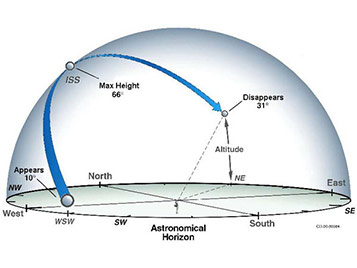How do I Spot The Station?
What does all this sighting information mean?
Time is when the sighting opportunity will begin in your local time zone. All sightings will occur within a few hours before or after sunrise or sunset. This is the optimum viewing period as the sun reflects off the space station and contrasts against the darker sky.
Visible is the maximum time period the space station is visible before crossing back below the horizon.
Max Height is measured in degrees (also known as elevation). It represents the height of the space station from the horizon in the night sky. The horizon is at zero degrees, and directly overhead is ninety degrees. If you hold your fist at arm's length and place your fist resting on the horizon, the top will be about 10 degrees.
Appears is the location in the sky where the station will be visible first. This value, like maximum height, also is measured in degrees from the horizon. The letters represent compass directions -- N is north, WNW is west by northwest, and so on.
Disappears represents where in the night sky the International Space Station will leave your field of view.


